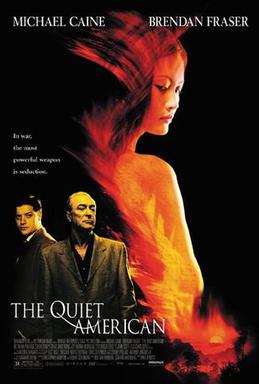Before The Fall- The Film Adaptation Of Graham Greene’s “The Quiet American” (2002)- A Film Review
DVD Review
By Sandy Salmon
The Quiet American, starring Michael Caine, Brendan Fraser, Do Thi Hai Yen, 2002, based on the novel by Graham Greene , 2002
Before the fall of Saigon in Vietnam (now Ho Chi Minh City) in 1975 graphically and forever etched in the historical mind by the famous photograph of a helicopter trying to evacuate fleeing Americans and their Vietnamese cronies from atop the American Embassy and before the first inklings in the Western mind that something big was happening after the French defeat at Dien Bien Phu Indo-China (the generic name for the whole are controlled by the French) there was an unquiet little civil war, a guerrilla insurgency playing out in that benighted region. Enter the quiet American, the CIA operative, here the fictional Alden Pyle, who represented American interests even at that early date to attempt to stem the tide. That is the central theme of the film under review, The Quiet American. (This film is the second coming of the adaptation of Graham Greene’s insightful book. The other version in 1958 during high tide Cold War red scare times played down the anti-war aspects of his piece and the futility of the third force strategy which reportedly, and rightly, enraged Greene.)
Of course with any political thriller there has to be a romantic piece to keep the plot moving between action scenes and in this case it is the “competition” between an English newspaperman, Thomas Fowler, a very married English newspaperman, played by Michael Caine and that quiet American, Alden Pyle, played by Brendon Fraser, for the hand of that Englishman’s beautiful Vietnamese mistress Phuong , played by Do Thi Hai Yen once he lands on the ground. But the central plot is about the doing of the CIA operative in trying to create a “third force,” a strategy which in every subsequent manifestation was doomed to failure since there in the end, the fall of Saigon end, there was no such force that could do anything against the two major forces contending for control of Indo-China, of Vietnam.
It is the intrigue involved in that futile action which eventually does our quiet American in. Finds him face down in the Pearl River with a couple of deep fatal knife wounds in him for his ill-disposed efforts. Alden posing as an aid worker (as in AID a known CIA conduit for all kinds of nefarious activities and still is) gets friendly with Fowler and even friendlier with his mistress and until his unquiet death and river dump was her lover. Along the way Alden tried to under cover of that aid worker ruse get a militia leader to be that “third force” leader to step in between the French colonials and the Communists. Of course that tin pot general was as corrupt as any subsequent “third force” general the Americans were able to rustle up and moreover had his own agenda of grabbing every dollar and every weapon old Uncle Sam would throw his way.
Sound familiar?
The really beautiful part, the part that seems prescient, this Alden and his kept general decided to stir things up a little, create a little more chaos, by trying to discredit the commies. So they plant bombs in the marketplace in Saigon and let the commies take the blame for the atrocities committed by the action. Fowler though gets a chance to kill two birds with one stone by letting his pro-Communist assistant know what was what about Alden’s involvement in the action. Alden gone to the shades Phuong comes back to Fowler. Was Fowler an accessory in the Pyle murder? I’ll never tell but a friend of mine who served in Vietnam told me the intrigue level at every level except covering for the guys in your squad was so fierce that anything could happen, happen to make ordinarily rational people snap. Watch this one if you want to get a flavor of up close and personal about why Vietnam was a quagmire the memory of which is still with us today.

No comments:
Post a Comment